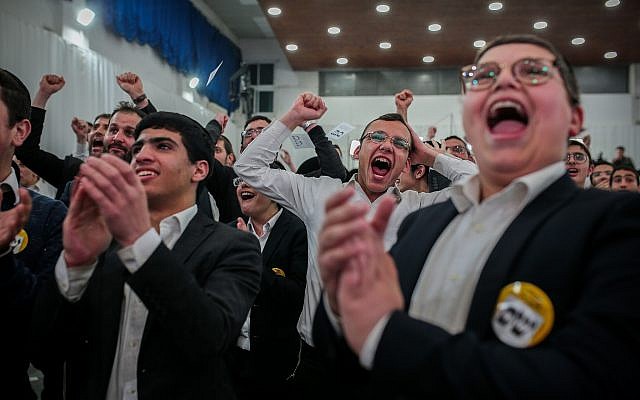Far-right URWP also declares it’s backing Netanyahu, but Liberman and Kahlon say they’ll wait until the final vote results are tallied

Both ultra-Orthodox parties and some right-wing parties immediately threw their support behind Prime Minister Benjamin Netanyahu after a pair of exit polls forecast Likud and its potential allies would take a majority of Knesset seats in Tuesday’s national elections. But Yisrael Beytenu leader Avigdor Liberman and Kulanu leader Moshe Kahlon preferred to vote for the votes to be officially counted.
Though the final vote tally could reduce the right-wing parties’ advantage, if the results stand they will put Netanyahu in a position to again form a government and serve a fifth term as prime minister, even if his Likud party is smaller than challenger Benny Gantz’s Blue and White faction.
Any decision on who will get the first chance at assembling a government ultimately rests with President Reuven Rivlin, who can pick whoever he believes is best positioned to form a ruling coalition and is not bound to choose the head of the largest party or whoever received the most recommendations from fellow faction heads.
Former defense minister Liberman said he would not endorse either Netanyahu or Gantz for prime minister until the final tally from the national election is in.
Smotrich, who is no. 2 on the URWP list, tweeted such a move “will build trust among all the [coalition] partners in the ability of this government to complete an entire term.”
Such legislation if applied retroactively could shield Netanyahu from being indicted for corruption in a series of criminal cases that Attorney General Avichai Mandelblit recommended he be charged over pending a hearing.
Netanyahu has been coy regarding whether he would support legislation blocking him from prosecution, saying that he was not personally involved in such an effort but not explicitly ruling out whether he would prevent his political allies from pushing such a law.
Smotrich said the election results were a victory for right-wing parties and that a merger agreement backed by Netanyahu to include the extremist Otzma Yehudit party in the URWP “saved right-wing rule.”
He also took an apparent shot at Naftali Bennett and Ayelet Shaked, who broke off from URWP’s Jewish Home faction to form the New Right before the elections.
“Religious Zionism proved that its way is greater than people,” he said.
Rafi Peretz, the party’s leader, said URWP achieved its goal of “saving the home,” apparently referring to the poor polling results the party received in the wake of Bennett and Shaked’s decision to split off.
“Not only did we achieve our mission and save the home, we also saved the entire national camp,” he wrote on Twitter.

Despite two of three exit polls published by Israel’s main television networks forecasting New Right did not receive sufficient support to enter the Knesset, Bennett expressed optimism the party would be in when the final vote count was over.
“Don’t be discouraged,” New Right leader Naftali Bennett said in a message to supporters, after two exit polls said his party would fail to enter the Knesset. “Leadership is tested in tough moments, not when it’s easy. We have patience, great faith and nerves of steel.”
Bennett said his party was confident that the soldiers, whose votes are tallied last, will carry the party into the Knesset.
“The New Right party will pass [the threshold] and pass nicely, patience.”
Moshe Feiglin, head of the Zehut party which wasn’t predicted to enter the next Knesset by any of the three exit polls, also expressed hope that the soldiers’ ballots will change everything.
“Nobody knows tonight if Zehut is in [the Knesset],” Feiglin said. “The soldiers’ votes alone have something like eight seats and they haven’t been counted yet.”
As reported by The Times of Israel
